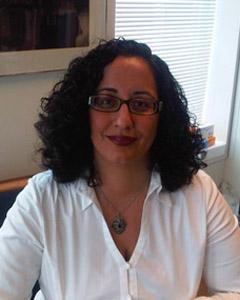Meet EPA Exposure Scientist Dr. Tina Bahadori

Dr. Tina Bahadori is an exposure scientist with extensive expertise developing and managing research programs that integrate exposure with health sciences. Prior to coming to EPA, Dr. Bahadori was Managing Director for the American Chemistry Council's Long Range Research Initiative.
Dr. Bahadori is the immediate past President of the International Society of Exposure Science and is an Associate Editor of the Journal of Exposure Science and Environmental Epidemiology. She has served on several committees for the National Academy of Sciences, the Center for Disease Control and Prevention, and the National Children's Study.
How does your science matter?
The goal of our research is to develop approaches that not only let you understand the impacts of chemicals and materials in commerce but it also allows you to design techniques to design future materials that enhance the benefits to the society while minimizing the risk to society and the environment. We want to enable innovation and innovative products while preserving and sustaining our environment for future generations.
If you could have dinner with any scientist, past or present, who would it be and what would you like to ask them about?
Michelangelo. To have that profound understanding of the interconnections between physics, physiology, mechanisms, and art and to "see" the relationships is great. The ability to visualize and articulate that vision in art and engineering is inspiring. To me this relates to how science is such a Renaissance profession. That was always my thinking for how science could be effective—to see the continuities and discontinuities among humans, materials, and the environment. I would ask Michelangelo 'HOW?' How do you keep your mind open? What do you have to do to keep a transparent mind to see the interconnections that may otherwise not be visible?
What do you like most about your research?
It lets you develop approaches to enable sustainable innovations. An interesting challenge is to use science to advance and address society's needs both in the short term and in the long term. This research allows you to develop more effective solutions.
When did you first know you wanted to pursue science?
When I was very little. My parents were both scientists. They were physicians and public health scientists, well before there were so many terms like environmental health scientist. I was always curious as to how you could define issues that impact societies and communities. There were so many challenges, problems, and drivers in society when I was growing up. But many of them did not have straightforward solutions. From my perspective, and seeing things through my parents' eyes, we needed science to generate those answers and solutions.
Tell us about your science/educational background.
I trained at MIT to be a chemical and combustion engineer. The work I did there was to see how you could optimize engine performance to be more fuel efficient and at the same time put out less harmful combustion by-products. This was my first exposure to the balance of costs and benefits.
That work motivated me to get my Masters in Technology and Policy. I wanted to see how technology informed policy or how policy drives the direction of technology. I also got an undergraduate degree in humanities, I felt that the training in humanities would force me to keep up with literature, and critical reading/writing, et cetera. This was important to me to evaluate information critically and be a better communicator of information.
The humanities degree forced me to keep up my skills that would prove to be useful in a multi-media world. When I finished my Masters degree, I worked for 10 years in environmental risk management. There hadn't been a lot of thought put into sustainability at that time. Environmental issues were not considered appropriately in transactional costs. How do you monetize environmental impact? You need to understand this in order to do the full assessment of benefits and costs.
I then went to Harvard to get my Doctorate in Environmental Science and Engineering from the Harvard School of Public Health. The idea was to bring it all back to humans and societies. I wanted to understand more about what aspects of human behavior influence their interactions with the environment and enhance or mitigate their exposures and vulnerability to environmental risk.
What brought you to EPA?
I had worked in the private sector the majority of my career. I saw that my academic training and professional background provided the opportunity to explore and create circumstances in which different societal stakeholders can engage in partnerships to form effective and beneficial communities and societies.
Coming to EPA has completed my training and professional circle by bringing me into public service.
What, in your opinion, is the most important thing you've worked on?
I have had the opportunity to work on the issue of school environments and their impact on the health of our children. Understanding the physical environment of children and how it affects their lives and their ability to learn and their long term health is critical.
A school with aging infrastructure and little resources automatically puts the children at a disadvantage. We squash the American Dream when we deprive our children of a healthy environment in which they can thrive. If we're going to protect our children we need to protect their environment.
If you were not a scientist, what do you think you would be doing?
I would probably be a pediatrician.
Any advice for students considering a career in science?
I think being a scientist is one of the most enabling professions. There are so many levels in society in which you can contribute to. There are so many problems in our society that require science-based solutions; scientific training should be seen as a door-opener to a diversity of opportunities.
Editor's Note: The opinions expressed herein are those of the researcher alone. EPA does not endorse the opinions or positions expressed.
